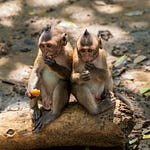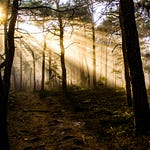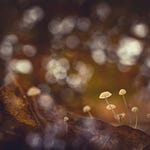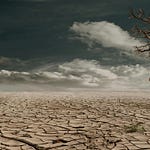The character Birdie in Hope Floats said something that’s stayed with me for the 27 years since I first saw the movie:
“Beginnings are scary, endings are usually sad, but it is the middle that counts the most. You need to remember that when you find yourself at the beginning. Just give hope a chance to float up.”
We’re in the messy middle right now — in our own lives, in our communities, in the world. Even when everything seems bleak or broken, the story isn’t over. And as long as we’re still here, still breathing, still choosing, we can change the outcome.
This isn’t how the story has to end.
I’m not saying things are rosy. It often feels like we’re stuck at the top of a roller coaster — upside down — with no idea when or if it will right itself. There are devastating floods and other natural disasters. Wars. People losing government jobs with no warning. Services cut, hospitals closing, healthcare in crisis. We’re seeing people rounded up without due process and shipped off — to other parts of this country, to their country of origin, or even to some third place entirely.
There’s a harsh “power over” dynamic taking hold — comply or else — where cruelty is championed, and empathy is treated like a weakness. Maybe you’ve noticed this too: empathy is starting to sound like a bad word in the public square. We’re told it makes us soft, gullible, or disloyal. That cruelty somehow makes us stronger. But that’s a lie.
If you peel all this back, you’ll often find fear at the root: fear of change, fear of the “other,” fear of losing whatever status or security we think we have, fear that if someone else gains, we somehow lose.
And yet in the midst of all this — the fear, the cruelty, the temptation to close off — I try to remember that while I can’t control the world, I can still choose how I move through it.
No one captured that truth more powerfully than Viktor Frankl, who survived Nazi concentration camps and wrote:
“Everything can be taken from a man but one thing: the last of the human freedoms — to choose one’s attitude in any given set of circumstances, to choose one’s own way.”
I’m not Viktor Frankl. I doubt I’d have had the clarity to look up through a hole in the barracks roof and find hope in a patch of sky. I suspect I’d have been consumed by hunger, lice, and despair.
But the truth is, none of us really knows what we’re capable of — for better or worse — until we’re in the messy middle of our own hard circumstances. Sometimes we fail to rise. Sometimes we surprise ourselves with unexpected courage.
And most of us, thankfully, are not standing at that kind of edge. We still have food, shelter, and some measure of safety. We still have room — and responsibility — to decide how we’ll meet this moment.
It almost sounds impossible, doesn’t it: that we could truly shape our attitude even in the hardest times, like something only saints or the rarest among us could manage. But maybe it’s less a miracle and more a quiet part of being human. Psychology and neuroscience show us that hope and compassion are muscles we can strengthen, rewiring our brains, easing our stress, and helping us meet life with a little more steadiness and grace.
Hope acts like fuel for our minds. It helps us set goals, figure out pathways to reach them, and stay motivated even when we hit obstacles. People with higher levels of hope are more resilient, less anxious, better able to navigate life’s twists and turns. Neuroscientists have shown that compassion practices — like loving-kindness meditation — literally change our brains. They strengthen circuits tied to empathy and joy, dial down regions linked to fear and harsh self-criticism, and even reduce inflammation in the body.
So empathy and hope aren’t signs of weakness — they’re among our greatest sources of strength. They regulate our nervous systems, deepen our bonds, help us stay clear-headed enough to choose love over fear.
That’s all well and good in theory — in studies, in brain scans, in hopeful sayings about choosing your own way.
But I know how quickly all of that can vanish when hopelessness takes hold.
I’ve been there.
Back in 1997, I stood beside a lake, newly divorced, isolated, feeling like there was no reason to go on. For a moment, I thought about simply walking in and not coming out. And then — out of nowhere — a faint breeze brushed my cheek. I don’t know why that small sensation cut through, but it pulled me out of my head and back into my body. I shuddered as if waking from a fog, turned, and went back to my car.
Since then, whenever hopelessness creeps in, I pay attention. I work through it. Because I’ve seen where it can take me if I don’t. Hopelessness often comes tangled up with helplessness — with fear, anger, and grief.
And yet, I’ve found my way through by returning again and again to love. To deliberately wish good for myself, for others, and for this beautiful, troubled world. Not to deny reality — but to shape how I meet it, from the inside out.
When we practice wishing well for ourselves and others, we’re not just softening our hearts. We’re building the mental and biological resources we need to keep going. With a little more steadiness. A little more hope. A lot more love.
So I invite you to join me now — three breaths, three blessings:
May I be safe. May I be whole. May I be loved.
May you be safe. May you be whole. May you be loved.
May we all be safe. May we all be whole. May we all be loved.
This isn’t a magic spell that instantly fixes everything. But love — offered first to ourselves, then to others, then to all — is still the most powerful magic I know.
And remember, this is just the middle. It may be messy and uncertain, but it counts the most.
So let’s give hope a chance to float up.
Because this is not how the story has to end.
Joni Miller, Ph.D., is a writer, researcher, spiritual coach, and speaker who uses her knowledge, education, and love of all things spiritual to help spiritual wanderers find a place they can call home, navigating by the light of Love. www.SpiritualGeography.net
Photo by Gabriela Palai: https://www.pexels.com/photo/person-standing-on-brown-wooden-dock-395196/













Share this post